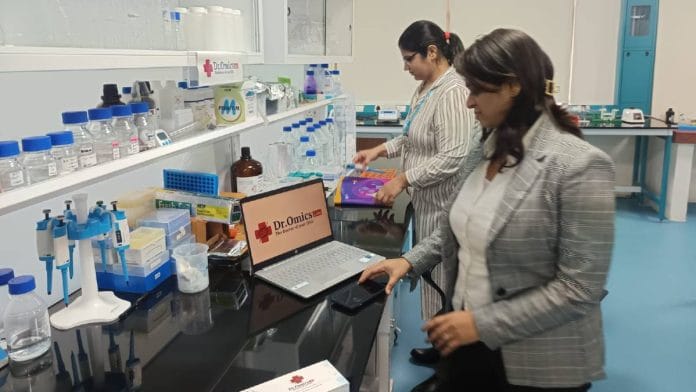Bengaluru: Indian swimmer Virdhawal Khade, an Olympian and winner of several South Asian Games gold medals, would have prepped himself better had he known about his chances of Anterior Cruciate Ligament (ACL) injury, which kept him out of action for more than a year.
“If I (could know I was) prone to any ligament injuries, then I and the physios would have definitely included exercises which would make sure the risk was minimised,” Khade told ThePrint, recalling the ACL tear in his knee in 2016 and 2018, a most common sports injury which may lead to knee instability or require surgery.
Genetic tests analysing biological data from genomics, transcriptomics, nutrigenomics or metabolomics, using computational tools, are increasingly becoming popular among professional and budding athletes. Transcriptomics show how genes are expressed in athletes. Metabolomics gives information about metabolic pathways. The data together aims at risk assessment and prevention of injury, besides better treatment for existing ones.
One Delhi-based genomics company that assesses risks and provides athletes with personalised injury recovery plans, as well as training and diet regimens, is Dr.Omics.
Moving away from one-size-fits-all, its core approach is custom-made strategies based on the genetic makeup of individual athletes. Genomics or bioinformatics tests conducted at Dr.Omics return what can be called “precision genetic information” of athletes. These identify DNA variants linked to athletic performance.
“We can use that genetic code (information) for specific things like injury recovery or nutrition or prevention of injury. For example, I can tell (the chances) for ACL rupture or endurance for sprint,” said Swapnaja Patil, a research scientist at Dr.Omics.
The Centre is currently amplifying the ‘Khelo India’ project to “encourage sports all over the country, thus allowing the population to harness the power of sports through its cross-cutting influence, holistic development of children and youth”. In this atmosphere, the genetic tests could help nurture healthy athletes, according to Patil.
Khade too asserts that “it can be a game changer with regards to managing injuries as well as improving the performance of our athletes in the future”. However, for a country like India, relying solely on genetic-based sports excellence prediction can do more harm than good because of lack of country-specific data on genetic parameters.
“We take parameters from the West and then try to transplant them on our Indian milieu which is not what is required. If we don’t have a database, it is worthless,” said Dilip Heblé, MD & CEO of Gāyo Fitness Academy, another agency that has been providing education and training in fitness, sports and nutrition sciences since 1998.
Also Read: Doctors still treat heart disease with trial and error. This start-up wants to change that
From blood samples to personalised plans
Athletes go for a genomics analysis by providing a blood sample. Dr.Omics analyses these in its laboratory to generate relevant genetic data. The raw genetic information is not of much help on its own. The data, therefore, is cross-referenced with biological databases to understand, for instance, the expression of genes related to injuries in individual athletes.
“We can use the data accordingly (as) we already have the (general) database with us. And we can build a portfolio,” Patil said.
“There is a DNA variant called COL5A1. With the help of that, we can understand if there is a specific ACL tear. So, we can treat it (accordingly). There will be better recovery. That is the benefit, rather than working with a random or generalised treatment,” she explained.
The genomics test kit provided by Dr.Omics not only promises faster recovery from injuries but also has the potential to forecast future health risks, known as predictive prevention, according to its website. “If it’s a genetic factor, then there are a lot of things you can do today with regards to diet and exercises to prepare yourself,” said Khade.
While the researchers at Dr.Omics did not comment on the price of the kit, its website lists a special price of Rs 21,999.
With the help of nutrigenomics, the company also provides a diet for athletes depending on the data. “Every second fellow in India is taking whey protein in the gym whether he wants it or not. It is peer pressure or wrong advice given by trainers. Everybody can’t be taking whey protein because some of us can have lactose intolerance,” said Heblé.
According to Khade and Heblé, such tests should be conducted at puberty, so that an aspiring athlete can excel at the right sport.
“Genetic testing is great for sports people. It has still not caught on in India because in India, the sportsmen are more interested in getting a job at the bank or railways or a government job by getting some medals. By the time Indians reach the Olympic level or international level, it’s too late to train them,” Heble said.
There is also the high cost factor in such genetic testing that makes it inaccessible to the majority of Indians. “It has been encouraged for the last 8-10 years. There’s nothing new in it but you have to keep in mind that genetic testing is expensive. You don’t have such facilities in small towns,” said Heblé. Athletes like Khade are pushing for policy level changes and calling for intervention from national-level sports authorities.
“There has to be someone in the system or even outside the system who needs to suggest this (genetic testing) to the people in power. And once that happens, they need to provide funds and make this part of policy,” said Khade.
(Edited by Nida Fatima Siddiqui)
Also Read: Hyderabad eye institute wants AI to think like a doctor






